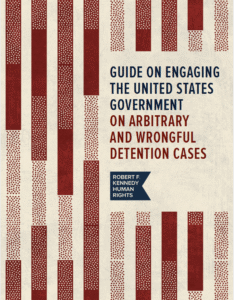(Washington, D.C. | September 1, 2015) Robert F. Kennedy Human Rights, in partnership with several other non-governmental organizations and academics, formally submitted observations to the United Nations Committee on Economic, Social and Cultural Rights (ESCR Committee) regarding human rights violations in Western Sahara. The ESCR Committee will review the Kingdom of Morocco’s compliance with the International Covenant on Economic, Social and Cultural Rights (ICESCR) in September 2015.
The report argues that Morocco’s occupation of Western Sahara is illegal under international law, and that Morocco has also denied the Sahrawi people a range of key human rights, including the right to self-determination, the right to access and dispose of their natural resources, the right to work, the right to education, and the right to take part in cultural life.
Under international law, Morocco has no legitimate claim to sovereignty over Western Sahara. Nevertheless, as the de facto Occupying Power in a non-self-governing territory, and as a state party to the ICESCR, Morocco must respect and implement the rights protected by the ICESCR in Western Sahara.
“Morocco continuously and routinely violates the economic, social and cultural rights of Sahrawi’s living in Western Sahara in clear contradiction with the ICESCR” said Kerry Kennedy, President of Robert F. Kennedy Human Rights, “It is vital for the ECSR Committee to draw attention to these violations, and for the international community to insist that Morocco abide by its obligations under international human rights law.”
Among those rights discussed at length in the report is the right to self-determination, which can only be fulfilled by a legitimate referendum that truly reflects the democratic will of the Sahrawi people. Since occupying the territory, Morocco has been unwilling to resolve the self-determination question in conformity with international law’s binding principles. The report also argues that Morocco fails to meet its international obligations when undertaking resource exploitation projects. The exploitation of natural resources in a non-self-governing territory must satisfy two conditions to conform to international law. First, the resources must be exploited for the benefit of the peoples in the territory. Second, the resources must be exploited in the name of the peoples or in consultation with their representatives. Morocco currently fails to meet either condition.
The report also exposes in detail violations of the right to work, the right to an education, the right to take part in cultural life, and addresses the many ways in with Morocco blocks the proper implementation of its treaty obligations by stifling those who speak up for their social, economic or cultural rights.
The analysis expands on a report submitted in January of this year, which sought to assist the ESCR Committee in developing its List of Issues to send to Morocco. During the upcoming review, the ESCR Committee will consider all available information, including from non-governmental organizations, and issue concluding observations regarding Morocco’s compliance with its treaty obligations and provide recommendations.




